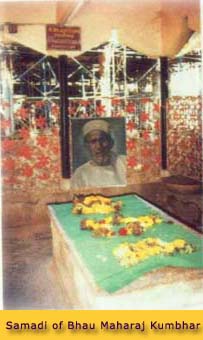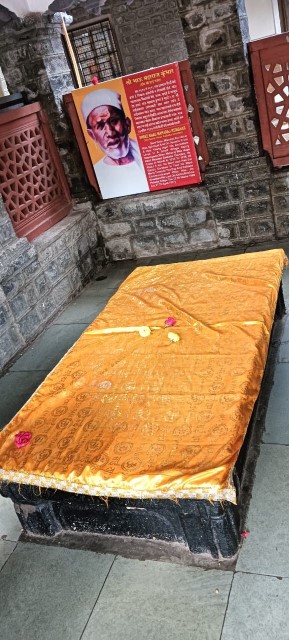|
Sant Bhau Maharaj Kumbhar was highly spiritual and an ascetic from a very young age. His ancestors lived in a small village called Kairey Neemgaon of Sangamner District of Maharashtra and were Kumbhars (potters) by caste and profession and hence the surname. Bhau Maharaj came to Shirdi from that village as a young man and never went back. In Shirdi he stayed near the Shani Temple. At other times he stayed below the huge banyan tree, on the way to Rahata. Sometimes, he went to Rahata, Sakori, Neemgaon and other neighbouring villages but always returned to Shirdi. Kumbhar was the kindhearted Baba devotee, who loved children and trees alike. He was very unselfish, and would give away clothes and food that were given to him by the villagers. He took Bhiksha and survived on the food that he thus received. He was sensitive to other peoples’ needs. Sometimes he begged for alms or asked visiting devotees for money. But as soon as he received it he distributed it to the poor and homeless. On rare occasions he kept a small amount of it, and bought some sugar and gave it to the children; at other times he bought medicines that a child was prescribed, and gave it to the mother. The clothes or blankets that he received he gave it to the needy. He loved all living things, and was known to wrap a blanket around a tree, as he felt the tree also felt the bitter cold of Shirdi. Bhau Maharaj had cordial relationship with everyone. He spoke softly and respectfully. The villagers and visiting devotees liked and respected him. Sometimes mischievous people fought with him and stole the money or the clothes that he had received. This did not bother him and he showed no rancour towards the thieves. He did not hoard anything; his earthly possessions consisted of a staff, a khadi dhoti, a khadi turban and vest. On his shoulder he always carried a blanket made of sheep’s wool. Bhau Maharaj kept himself busy cleaning the streets of Shirdi. Between 8 a.m. and 2 p.m. he swept each and every street of Shirdi. This he did with his own blanket. Besides, he cleaned every gutter and every outdoor sink where the housewives wash their utensils and clothes. He swept the streets again before dusk, and pulled out any floating debris from the gutters. Whether it rained or was scorching hot he did not deviate from his daily routine. At about 5 a.m., he went and had Baba’s darshan. This he did rather secretively. In fact, he went many times in the day and Baba communicated with him verbally or silently. The other devotees did not know when he went for darshan. Nor could they decipher the spiritual guidance given by Baba. Baba treasured the spiritual sessions that he had with Baba and did not divulge their contents to anyone. Once Butti asked him about it. Bhau Maharaj smiled and replied “My father gives me 1/4th of his Bhakari and tells me sweet stories”. After Baba took Mahasamadhi, Bhau Maharaj took darshan of his Samadhi several times in the day. This he did secretly and no one could figure out when he went for Darshan. The attachment between Baba and Bhau Maharaj was very deep and strong. About a week before he took Samadhi, Bhau Maharaj was sick. He had loss of appetite and did not eat anything. He drank a great deal of water. The symptoms indicated that he had severe diabetes. Raghuvir Bhaskar Purandare and Sagunmeru Naik looked after him and took great care of him. He breathed his last on Chaitra Krishna Paksha Dwadashi the 12th Shake 1860 (i.e., 27th April 1937). The news of his demise spread like wildfire. The devotees gathered together and built his Samadhi under the neem tree on the way to Lendi Baugh.
Samadhi of Bhau Maharaj Kumbhar On 7th May 1937 i.e, 12th Day of his demise there was a grand Bhandara (feast) in the honour of the gentle saint. The next day (i.e., 13th day) there was another feast of Shira (a type of halva made with jaggery) and a multitude of devotees were fed to their hearts’ content. On this auspicious day a beautiful portrait of Sant Bhau Maharaj Kumbhar was given a place of honour in the Samadhi Mandir photograph gallery. Every year in Chaitra Masa, the Shirdi Saibaba Sansthan performs his Punyatithi and a grand Bhandara is organized, and any and everyone can partake in it. Even today many mothers, bring their infants and lay them on his Samadhi, and take a little dust from it, and apply it to the forehead of the child with a prayer that the child may grow up to become just like him. (Source: Ambrosia in Shirdi and Baba's Gurukul by Vinny Chitluri. Photo Courtesy: Shri.Pranav, Sagar Colony, Nirmal District, Telangana)
|


